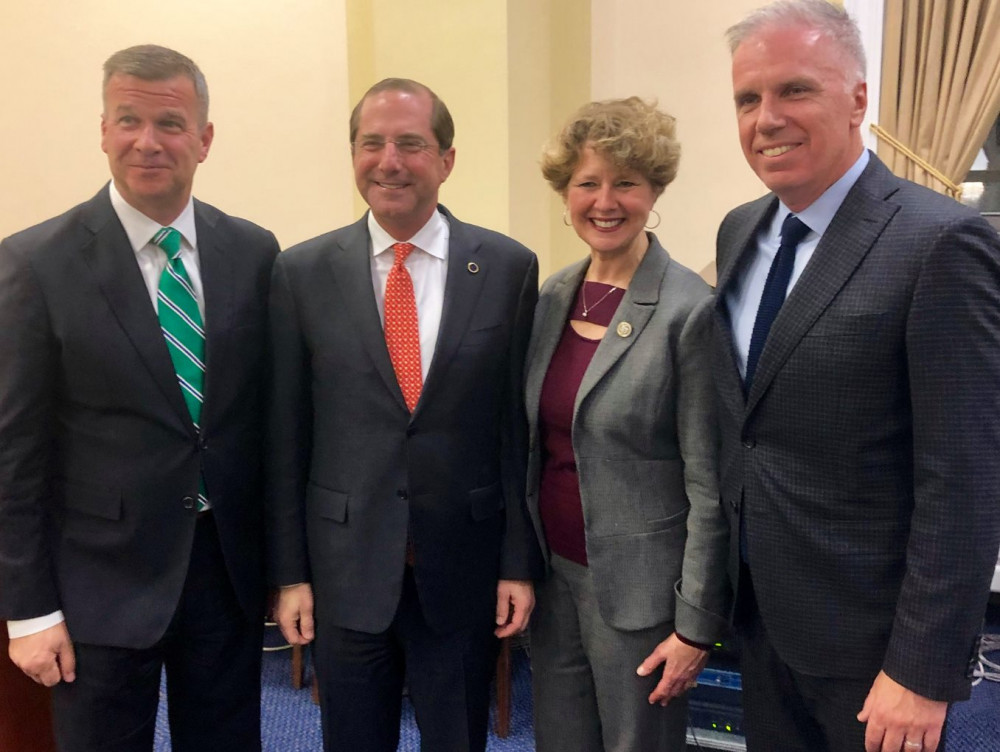
Federal officials are pushing for the Pandemic and All Hazards Preparedness and Advancing Innovation Act of 2018 (PAHPA), which was approved by the U.S. House of Representatives in September, to be signed into law this year.
In a discussion on Wednesday hosted by the Alliance for Biosecurity about biosecurity preparedness attended by members of the Congressional Biodefense Caucus, U.S. Rep. Susan Brooks, (R-IN), who sponsored the legislation, H.R. 6378, told the audience that PAHPA ensures that the national stockpile of vaccines, medical equipment and diagnostics are prioritized for further development. In addition, the act would fund the training of health care professionals to respond to possible pandemic outbreaks.
U.S. Reps. Anna Eshoo (D-CA), Greg Walden (R-OR), and Frank Pallone, Jr. (D-NJ) cosponsored the bill, which has been under consideration in the Senate since Sept. 26.
“I’m proud to have worked in the House with my colleagues, especially Congresswoman Eshoo, to pass this comprehensive bill, and hope my colleagues in the Senate work swiftly to do the same,” Brooks said.
Reps. Brooks and Eshoo established the Congressional Biodefense Caucus this Congress as they worked on drafting the PAHPA legislation. The caucus serves as a platform to educate members of Congress on the threats the United States faces from a chemical, biological, radiological or nuclear attack or pandemic outbreak.
Specifically, the PAHPA legislation would reauthorize funds to improve bioterrorism and other public health emergency preparedness and response activities, such as those operated by the Hospital Preparedness Program, the Public Health Emergency Preparedness Cooperative Agreement, Project BioShield, and the Biomedical Advanced Research and Development Authority (BARDA), part of the U.S. Health and Human Services’ Office of the Assistant Secretary for Preparedness and Response, for the advanced research and development of medical countermeasures.
As for funding, the proposal would create a Public Health Emergency Response Fund for the Health and Human Services Secretary to use as a “funding bridge” when an outbreak occurs. This bridge would be present until immediate funding is available from Congress to supplement with an emergency appropriations bill.
Secretary of Health and Human Services Alex Azar spoke to attendees and explained that pandemic influenza is the biodefense threat that concerned him the most. PAHPA would authorize $250 million for research and development of medical countermeasures to combat pandemic influenza, according to a news release issued by Brooks’ office.
Secretary Azar also mentioned his previous experience as a Deputy Secretary at HHS and his hand in drafting the first 2002 Bioterrorism Act, a precursor to the creation of the Office of the Secretary of Preparedness and Response (ASPR).
Rick Bright, director of BARDA, and Robert Kadlec, Assistant Secretary for Preparedness and Response, also participated in the event. The biosecurity leaders discussed the Trump Administration’s renewed focus on biosecurity as evidenced by the National Biodefense Strategy, which was unveiled last September.
“It was a very productive and insightful discussion,” said former Congressman Jack Kingston, who now serves as Secretariat for the Alliance for Biosecurity. “Secretary Azar reinforced the need for America to be prepared whether for pandemics or potential chemical or biological attacks. With Secretary Azar, ASPR Bob Kadlec, and Biomedical Advanced Research and Development Authority (BARDA) Director Rick Bright, we are confident in the Administration’s ability to work with Congress to maximize public-private partnerships and protect all Americans.”
This year marks the 100-year anniversary of the 1918 influenza pandemic, which killed more people than World War I. During that pandemic, more than 25 percent of the U.S. population became sick and 675,000 Americans, many of them young, healthy adults, died from the highly virulent influenza virus, Kadlec testified before the House Committee on Appropriations earlier this year.
In an editorial which appeared in The Hill in July, Kadlec also wrote: “Paramount to reauthorization is recognition that while our nation is better prepared than in the past for the health effects of disasters, we must continuously update our readiness programs in order to save lives and protect Americans from evolving 21st century health security threats.”
This summer The Alliance for Biosecurity — a coalition of biopharmaceutical companies and academic partners that support public-private partnerships in order to advance medical countermeasures for the benefit of public health and national security — along with the U.S. Chamber of Commerce, which represents the interests of more than 3 million businesses, penned a letter of their support of PAHPA.
“Our groups support developing strategic partnerships between BARDA and the business community to mitigate threats that could pose a significant risk to U.S. health and safety,” the letter said.




